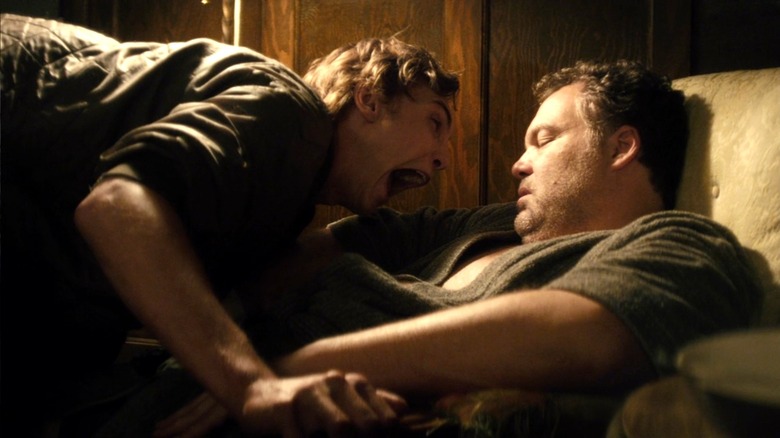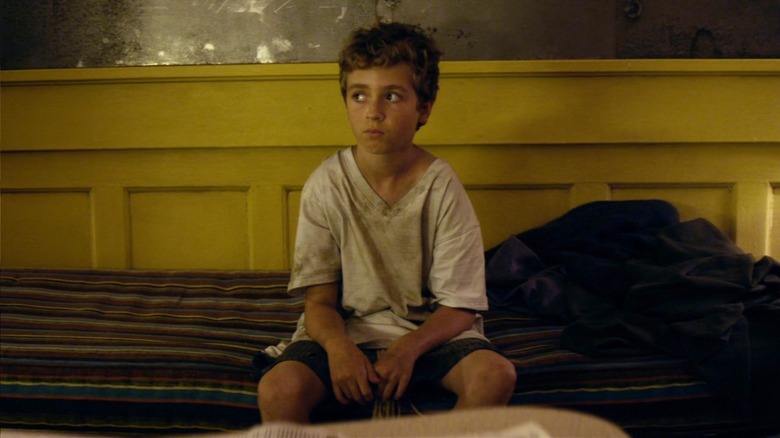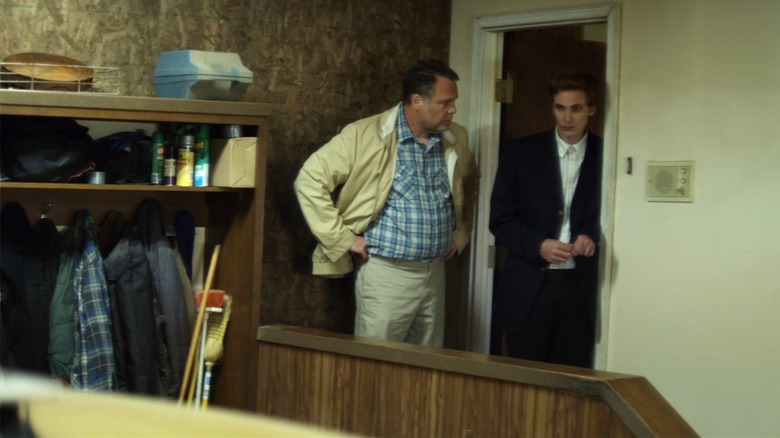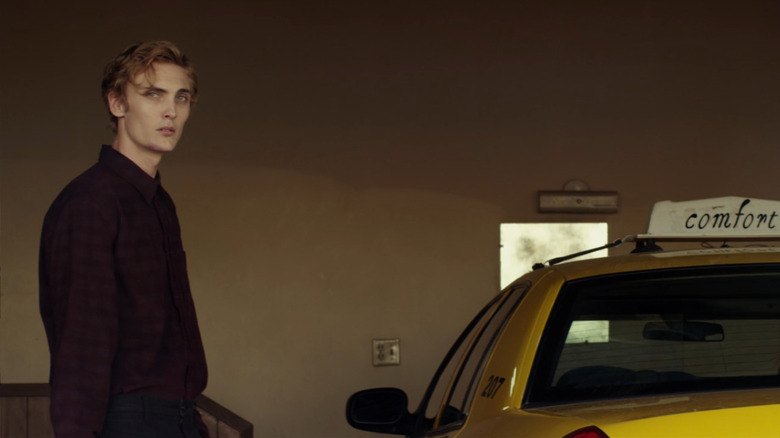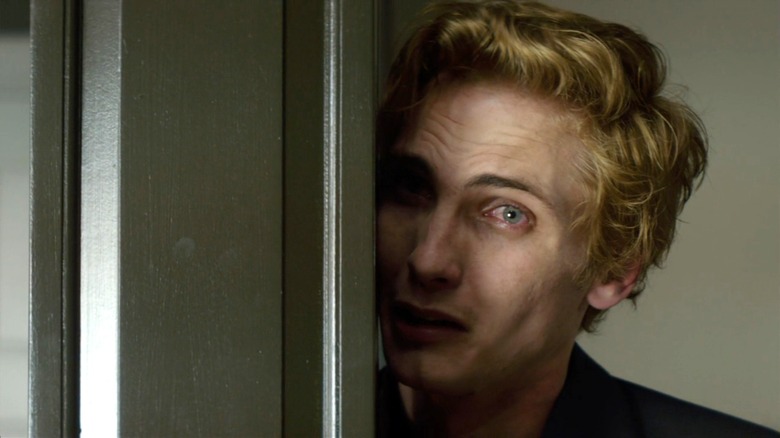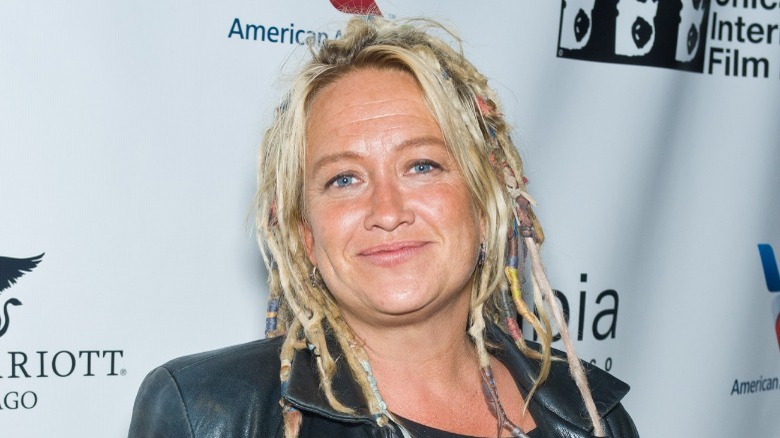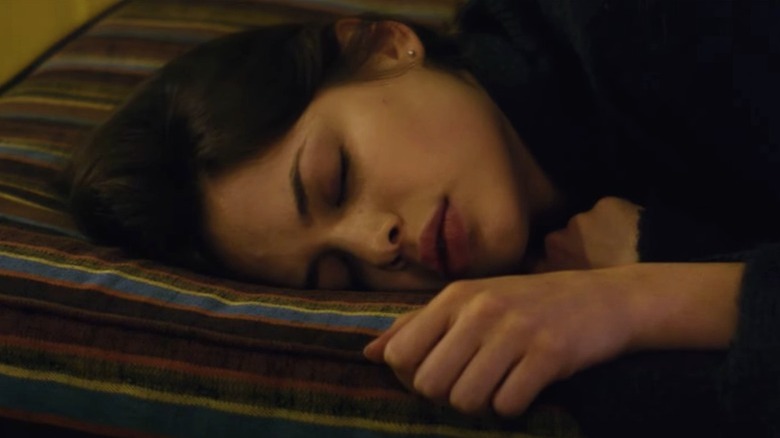Chained Ending Explained
You may remember "Chained," the 2012 psychological horror film directed by Jennifer Lynch, starring Vincent D'Onofrio. The actor gives one of his darkest performances as Bob, a cab-driving serial killer who kills Sarah (Julia Ormond) and imprisons her son Tim (Evan Bird), a 9-year-old boy he will call "Rabbit" over 10 miserable years.
"Chained" divided both critics and audiences with its morbid premise, sadistic violence, and twist ending, which Lynch herself described as feeling "tacked on." That may be true, but it certainly shakes up the narrative for the theory-inclined viewer and begs many questions about the relationship between Bob, Rabbit, and his father Brad — how did this begin, why did he do it, and what did he have to gain?
Then, there are the credits, which tease you with sinister diegetic sounds; has Rabbit lost his humanity, or is there an innocent (or even hopeful) explanation? There is no single answer, but from the filmmakers' perspective and my own, here is the ending of "Chained" explained.
Chained's plot revisited
"Chained" is a truly upsetting serial killer movie — a grimy film with a deeply warped premise. Bob is a taxi driver who lives alone in an isolated bungalow in the Canadian prairie. His job gives him access to women, whom he kidnaps and murders on a regular basis. One afternoon, Bob picks up Sarah and her son Tim outside a cinema, appearing by the curb as if he'd been waiting for them.
The drive begins without suspicion until Bob fails to turn off the freeway. Sarah protests, but Bob ignores her, shutting the screen to muffle her cries. He drives the mother and son to his garage and proceeds to kill Sarah and keep Tim, renaming him "Rabbit." Bob consigns the boy to a life of slavery, which ranges from domestic chores to burying his victims in the designated burial room.
With this relationship established, "Chained" skips some 10 years. Rabbit (Eamon Farren) is now a young man and has a growing nerve that inspires Bob to groom him as his partner and heir. He teaches Rabbit human anatomy and attempts to strengthen the teenager's loyalty by informing him that his father, Brad (Jake Weber), has moved on and remarried. Then, knowing he must be proactive to manage any rebellion, Bob presents Rabbit with a yearbook and demands that he select a woman for them to abduct. Rabbit does so under duress — he chooses a young woman named Angie (Conor Leslie) — but will he go through with it?
If you or someone you know may be the victim of child abuse, please contact the Childhelp National Child Abuse Hotline at 1-800-4-A-Child (1-800-422-4453) or contact their live chat services.
What happens at the end of Chained?
Bob kidnaps Angie in town, but Rabbit is on his own back at the bungalow. This is his time to prove himself and show that he too is a remorseless killer. He may kill purely out of fearful indoctrination, and this is ostensibly confirmed when he stabs Angie in her abdomen's side. However, this is a ruse. Rabbit used his anatomical knowledge to inflict a vicious yet non-lethal wound on Angie that displays faux-commitment to Bob and buys time for Rabbit to save her and himself.
With Angie ditched in the burial room, Rabbit asks Bob to "hunt" together in the taxi. Bob agrees and they prowl the street, eyeing potential victims. Rabbit dismisses Bob's suggestions, stalling him. Then, in the reflection of a glass noticeboard, Bob sees that Rabbit has written "help" on the taxi in red lettering. Bob knocks Rabbit unconscious and drives home, suspecting that Angie is not dead. He's right — when Bob lumbers into the burial room, Angie slashes his Achilles tendon before Rabbit takes a knife to the pit of his jaw, killing him.
With Angie safe and his oppressor finally gone, Rabbit turns up at his father's house, where he finds a strained reception. Violence happens when Rabbit confronts him about the dreadful truth — Bob was Brad's brother and Brad paid him to murder Sarah. Brad attacks both his wife Marie (Gina Philips) and Rabbit, sending Rabbit into a righteous fit of anger. He kills Brad with a blow to the head. Disgusted by the events, Marie calls the cops and blames the attack on a burglar, allowing Rabbit to flee the scene.
What happens during Chained's credits?
Before the film's closing moments, it seems that Rabbit has emerged from this miserable, life-robbing trauma with a reliable moral compass. However, the credits mire the viewer with doubt. There is no imagery beyond the titles, just the sound of Rabbit returning to the bungalow and following a routine eerily similar to Bob's. He opens the fridge, sips a beer, cuts paper, returns to the cab, and then opens the garage door. This short aural narrative begs a lot of questions. Why did Rabbit go home and not to the authorities? What was he cutting? Where did he go in the taxi? And, crucially, what happened to Angie? The last time we saw her she was asleep on Rabbit's bed, recovering from her ordeal.
The key sound here is Rabbit's cutting of paper. He is likely copying Bob's practice of cutting newspaper articles. If that assumption is correct, what article did Rabbit clip? There are at least three possibilities. One could be a column about "Bob Fitler, missing taxi driver." Bob may have been insular, but colleagues probably reported him missing (which begs the question of why police didn't visit the bungalow — a potential plot hole). Another article could concern Rabbit's father, the victim of a supposed burglary; such a dramatic story would certainly receive media attention. Then there's the third and most disturbing theory; Rabbit may have cut an article about Angie, a college girl that "vanished without a trace" (and is now interred, at Rabbit's hand, in the burial room).
What does the ending of Chained mean?
"Chained" ends inconclusively, but there is still meaning to glean from it. Rabbit may be filling Bob's void and adopting at least some of his macabre behavior. If this is true, then Rabbit has followed a similar cycle to Bob — a cycle in which abuse begets abuse.
Bob was a monstrous man, but director Jennifer Lynch suggests he was not born this way. Instead, the implication is forces beyond his control shaped him. Several flashback scenes depict Bob's father as a perverted tyrant who beat his son and wife and even forced them to have sex for his sadistic pleasure. Such pathological abuse indicates Bob's father passed some very warped genes onto his son, but Lynch's emphasis on trauma hints her characterization skews toward nurture rather than nature.
Bob's suffering imbued him with hate and a violent relationship with sex, and he resolved to inflict this pain on as many people as possible. Most victims knew this pain for a few brief hours before their awful deaths, but Rabbit was irrevocably saturated with it. Bob caught him in his formative years and did the best he could to make a man in his image. How successful he was is unclear, but the credits indicate he may have robbed Rabbit of his humanity.
It might not be that bleak, though. Look at what triggers violence in Rabbit. He killed Bob to protect Angie, and he killed his father to protect Marie. Unlike Bob, Rabbit's violence is defensive, not offensive. Killing Angie would go against his efforts to save her, yet her safety remains a mystery.
If you or anyone you know has been a victim of sexual assault, help is available. Visit the Rape, Abuse & Incest National Network website or contact RAINN's National Helpline at 1-800-656-HOPE (4673).
Jennifer Lynch's perspective
There is a lot of misery in the ending of "Chained" if you look for it, but that's not how Jennifer Lynch saw things. FearNet asked the director if she thought it was a "hopeful" ending and she said, "I do. I also see it as a very realistic ending." Lynch explained that the credits' "environmental sounds" portrayed Rabbit dealing with his trauma by falling into his "safest routines," which she suggested brings people comfort. She also told HeyUGuys, "In my opinion, Angie is fine," adding that when Rabbit opens the garage during the credits, his destination was most likely IKEA.
However, positive though Lynch's view may be, she does not dismiss others' interpretations. "I love a bit of uncertainty at the end of things," Lynch said, "It allows for dialogue and audience involvement after the movie. ... I adore the different views on what might become of someone who has survived such things."
The alternate ending of Chained
Jennifer Lynch has mentioned a director's cut on numerous occasions. During a Q&A at Berlin's Fantasy Filmfest, Lynch said her director's cut adds greater depth to the film's twist ending thanks in large part to Jake Weber, who plays Brad. Lynch explained that Weber gave "an incredible performance" that loaded the ending with "a lot more of a reveal." Unfortunately, due to production constraints, Lynch had to cut the scene, causing the ending to feel, in her words and others', "tacked on."
Lynch provided further detail on the production in an interview with ComingSoon. "I had a lot of control," she stated, "[but] I still want to do a director's cut." The director explained that the film was pre-sold across the world, forcing her to appease both producers and distributors when cutting her film. The movie and ending may not have been entirely her vision, but Lynch concluded, "I feel good about this cut, even though it doesn't include certain things. ... I think it's a very brave interpretation of the film."
